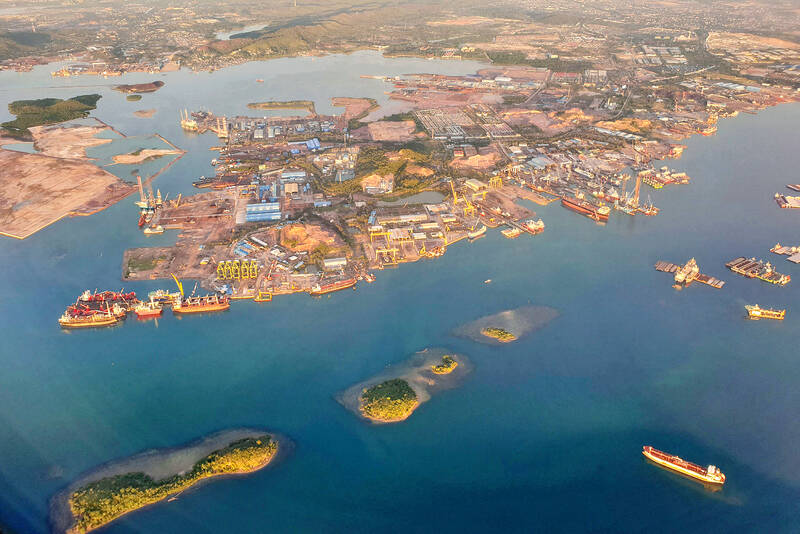Indonesia has sent hundreds of riot police to a tiny island after protests broke out against a China-backed project that would displace thousands of residents.
About 1,000 people protested in Batam City on Monday over a plan to develop Rempang island into a Chinese-funded economic zone, including the construction of a multibillion-dollar glass factory, that would displace about 7,500 people.
Some protesters clashed with security forces outside a government agency, wielding machetes, Molotov cocktails and stones, police said, adding that dozens were arrested.

Photo: Reuters
Beijing has poured money into infrastructure and resource projects in Southeast Asia’s biggest economy and its investments have previously caused social unrest, including a deadly January riot at a nickel smelting facility on Sulawesi island.
Police in Riau Islands province, near Singapore, said that 200 officers from the mobile brigade riot police unit known as Brimob were dispatched to the scene on Thursday.
“They are from Riau Province’s mobile brigade. The deployment is ... to create security,” police spokesman Zahwani Pandra Arsyad told reporters. “This is a precautionary step to ... maintain security as Batam, Riau Islands is strategic [for] people to do business and invest.”
Arsyad said the length of deployment “depends on the situation.”
Monday’s unrest took place outside a building of BP Batam, the agency that oversees the region’s development.
Jakarta secured a reported US$11.5 billion investment pledge from Xinyi Glass Holdings (信義玻璃控股有限公司), the world’s biggest glass producer, to build the factory during a visit by Indonesian President Joko Widodo to the Chinese city of Chengdu in July.
Widodo responded to the unrest on Thursday, saying that anger against the project was caused by miscommunication that could have been prevented if relocation package details were properly explained.
BP Batam has said the packages would include rent and meal compensation.
The government says the development will create tens of thousands of jobs for Indonesians.
It aims to attract more than 300,000 jobs by 2080, according to officials, who have not said when the project is expected to be finished.

AT RISK: The council reiterated that people should seriously consider the necessity of visiting China, after Beijing passed 22 guidelines to punish ‘die-hard’ separatists The Mainland Affairs Council (MAC) has since Jan. 1 last year received 65 petitions regarding Taiwanese who were interrogated or detained in China, MAC Minister Chiu Chui-cheng (邱垂正) said yesterday. Fifty-two either went missing or had their personal freedoms restricted, with some put in criminal detention, while 13 were interrogated and temporarily detained, he said in a radio interview. On June 21 last year, China announced 22 guidelines to punish “die-hard Taiwanese independence separatists,” allowing Chinese courts to try people in absentia. The guidelines are uncivilized and inhumane, allowing Beijing to seize assets and issue the death penalty, with no regard for potential

STILL COMMITTED: The US opposes any forced change to the ‘status quo’ in the Strait, but also does not seek conflict, US Secretary of State Marco Rubio said US President Donald Trump’s administration released US$5.3 billion in previously frozen foreign aid, including US$870 million in security exemptions for programs in Taiwan, a list of exemptions reviewed by Reuters showed. Trump ordered a 90-day pause on foreign aid shortly after taking office on Jan. 20, halting funding for everything from programs that fight starvation and deadly diseases to providing shelters for millions of displaced people across the globe. US Secretary of State Marco Rubio, who has said that all foreign assistance must align with Trump’s “America First” priorities, issued waivers late last month on military aid to Israel and Egypt, the

‘UNITED FRONT’ FRONTS: Barring contact with Huaqiao and Jinan universities is needed to stop China targeting Taiwanese students, the education minister said Taiwan has blacklisted two Chinese universities from conducting academic exchange programs in the nation after reports that the institutes are arms of Beijing’s United Front Work Department, Minister of Education Cheng Ying-yao (鄭英耀) said in an exclusive interview with the Chinese-language Liberty Times (the Taipei Times’ sister paper) published yesterday. China’s Huaqiao University in Xiamen and Quanzhou, as well as Jinan University in Guangzhou, which have 600 and 1,500 Taiwanese on their rolls respectively, are under direct control of the Chinese government’s political warfare branch, Cheng said, citing reports by national security officials. A comprehensive ban on Taiwanese institutions collaborating or

France’s nuclear-powered aircraft carrier and accompanying warships were in the Philippines yesterday after holding combat drills with Philippine forces in the disputed South China Sea in a show of firepower that would likely antagonize China. The Charles de Gaulle on Friday docked at Subic Bay, a former US naval base northwest of Manila, for a break after more than two months of deployment in the Indo-Pacific region. The French carrier engaged with security allies for contingency readiness and to promote regional security, including with Philippine forces, navy ships and fighter jets. They held anti-submarine warfare drills and aerial combat training on Friday in